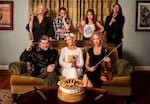
The collaborative feature film shot in Portland, "The Great Divide," will premiere at The Kennedy School Theater on October 8th and 10th.
Courtesy of The Great Divide
When the world’s richest old lady dies, her surviving relatives and their tag-a-long friends meet to parse out pieces of the billion-dollar pie she left behind.
That’s the story driving the collaborative feature film “The Great Divide.” OPB Morning Edition host Jess Hazel spoke with the director, writer, producer and composer John Skipp along with actor and producer Sarah Brody Webb about how they filmed the dark comedy in Portland.
The following transcript has been edited for clarity and length.
Jess Hazel: Tell me how the idea to make a collaborative film started because from what I hear, it’s kind of unusual to use this approach for a feature film. Right?
John Skipp: Oh, yeah. I joined the Actors Lab, which is an acting class here in town run by Kristina Haddad. And I joined it to be a better director of actors. Not because I wanted to be an actor myself. And then I just totally fell in love with this group of actors.
Then they had a thing called Lab Fest, which is a short film festival. You shoot three-minute films on your phone and everybody was doing them. And at the end of it, I was like, ‘I’m just gonna write a feature film for everyone and give everybody great roles so that they can star in a feature film.’
The important thing was to create an experience. An experience as we were making it and an experience for people to have. I think it’s really important to remember that spreading joy is a great responsibility for every individual human to consider. And this is a great way to spread joy. We had the best time.
Sarah Brody Webb: We were absolutely blessed to have Skip drop into our class. The idea of ‘make your own work’ is something you hear all the time. But that’s no small undertaking, especially a feature film.
To have this wonderful human come into your class and say, ‘I’m going to write a screenplay for you. And I’m going to write a role for every one of you that really exemplifies your strengths.’ Was just literally a gift falling into our lap. Making your own work is an amazing opportunity to just get out there and do it.

The crew and cast of The Great Divide gather on the deck of Sarah Brody Webb's home during filming.
Will Dziuk
Hazel: So you filmed this in seven days at your house. That seems like it would make for a very tight filming schedule. Can you tell me a little more about what that timeline looked like and how it affected the way that you filmed?
Brody Webb: It was a lot of work. But I would say the energy was amazing. People really gave it their all. And I personally can say it was the most fun I think I’ve ever had, even though my house was filled with people and camera equipment at all days and hours of the night.
Skipp: You know, we only had so much money. So it was really, ‘this is what we can afford to do.’ So I just scheduled everything within an inch of its life. Everybody was moving really, really fast, but that raises the excitement level and there’s not a lot of downtime.
Hazel: Do you think the adjustments you had to make with a more contracted filming schedule, did those affect the final product in any way? And how?
Brody Webb: Because we filmed a lot of the scenes in one take they are very improvisational and very real. I think if we had time to go, ‘Let’s try again. Let’s shoot that again. Let’s rehearse that’ ... It would have a very different feel.
Skipp: Yeah, there are no dishonest beats in this thing. Everybody’s really, really inhabiting their characters, which is the heart of good acting. I think it’s just really listening to each other and really being there in the space and not performing. I think the heart of acting is don’t act, just be real.

Director John Skipp (far left) confers with the crew of The Great Divide during filming.
Courtesy of The Great Divide
Hazel: Were there lessons that you were able to learn while filming in this more collaborative kind of way that you don’t think you would have learned in a more traditional filmmaking process?
Brody Webb: Well, I have to say this is my first filmmaking experience. So, I learned a lot. I can’t speak to how it compares to previous filmmaking experiences, but there is always more work to be done than you think there is. So even if you pad your schedule, you need to double that number. Most likely.
Skipp: Now we were working with an absolute skeleton crew. We had a director of photography, an AC, a first assistant camera, we had one gaffer and a sound guy and our first AD and that was basically the crew. Then make up…
Brody Webb: And PAs who came in to hold gear and do whatever we asked of them. Who were amazing.
Skipp: Exactly. So the amazing thing is sometimes it takes 20 minutes for the director of photography and the gaffer to figure out how they’re going to light and shoot something. And you’re like, ‘Argh, we gotta go!’ But then people would come in and nail their take in one take and we’re instantly off to the next thing. So it’s 20 minutes to wait two minutes to shoot and then we’re off to the next thing. And having shot in Hollywood, the level of professionalism here in Portland was right there with Hollywood.
